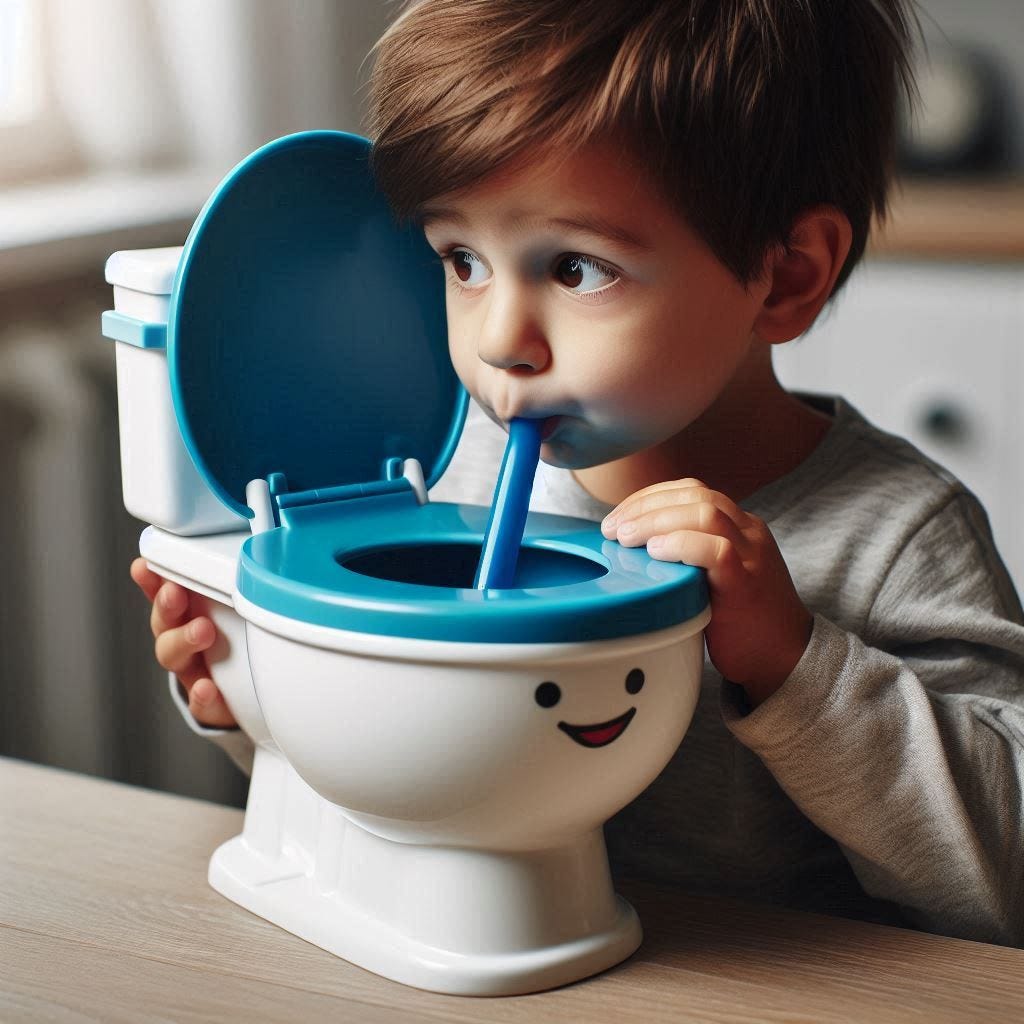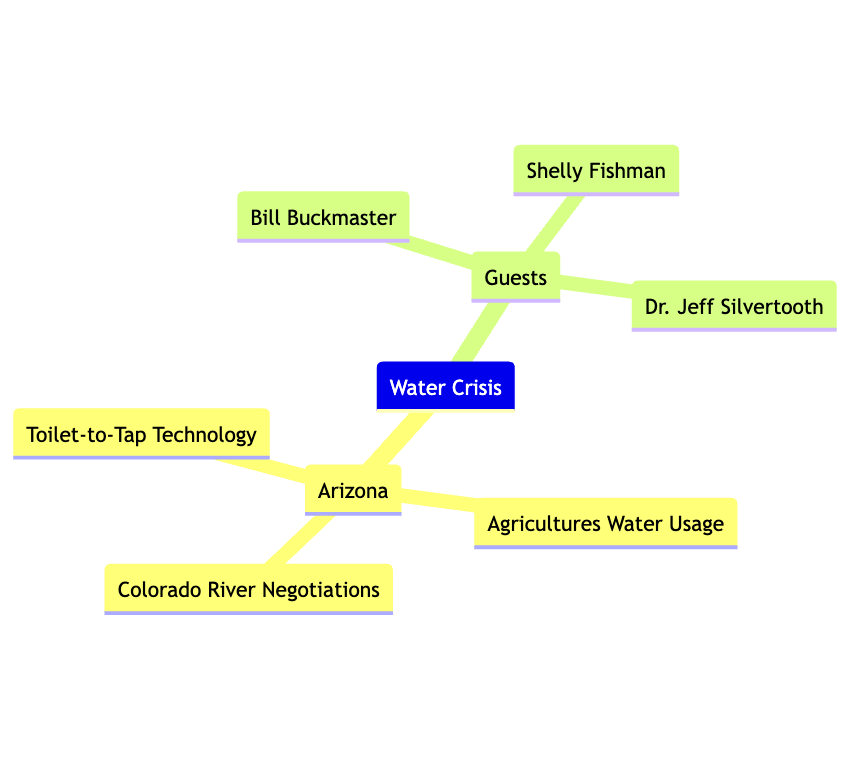💧 Arizona's Water Crisis: Can "Toilet-to-Tap" Solutions Save Us?
🌻 Agriculture’s Heavy Toll on Arizona’s Water Supply 🏜️ The Fight for Equitable Water Distribution 🎭 Debunking Myths Around Water Purification Technology
Based on the 11/5/24 Buckmaster Show on KVOI-1030AM.
Silvertooth's revelation that agriculture accounts for over 80% of Arizona's water consumption, with an average of 2,000 gallons required to produce the food consumed by each Arizonan annually, is a sobering statistic.
🧠 Mindmap of today’s show
🙊 Notable quotes from the show
"Many folks have speculated that there's a rush on the part of some folks to get that done because they think they could get a more favorable result" under a Democratic administration. - Dr. Jeff Silvertooth
"I don't like that term 'toilet-to-tap' because of what it implies. It's just negative." - Dr. Jeff Silvertooth
"We should be thankful to have it. If when it comes down the pipe for us, we should be thankful to have it." - Dr. Jeff Silvertooth
"We've recruited a lot of water to live, particularly in the way we live today." - Dr. Jeff Silvertooth
⏮️ ICYMI: From the Last Show…
🚘 Death Trap on Mexico's Highway 2: Cartel Checkpoints Terrorize Travelers
Based on the 11/4/24 Buckmaster Show on KVOI-1030AM.
😽 Keepin’ It Simple Summary for Younger Readers
👧🏾✊🏾👦🏾
💧 Arizona is running out of clean water, so they are trying to find new ways to get more. Some people are worried about using water from the toilet, but the experts say they can clean it really well to make it safe to drink. Farmers also use a lot of water to grow our food, and the state is trying to figure out how to make sure there is enough water for everyone.
🗝️ Takeaways
💧 Arizona faces a serious water shortage, with agriculture consuming over 80% of the state's water supply.
🚽 "Toilet-to-tap" purification technology exists but suffers from public skepticism.
🗳️ Election outcomes could significantly impact negotiations over Colorado River management agreements.
🎤 Dr. Jeff Silvertooth emphasizes the necessity of educating the public about water treatment technologies.
⏬ Jump to the 🦉 Three Sonorans Commentary based on:
📻 What They Discussed
The Buckmaster Show on November 5, 2024, covered various topics related to the economy, water issues, and the upcoming election. The show featured two guests:
Shelly Fishman, a financial contributor, and
Dr. Jeff Silvertooth, a University of Arizona agronomist.
The discussion touched on the state of the economy, the potential impact of the election on water policy, and the controversies around "toilet-to-tap" drinking water projects.
🗳️ Election Implications on Water Policy
The discussion explored how the outcome of the election could impact the ongoing negotiations over the management of the Colorado River.
With the current federal agreements set to expire in 2026, there was speculation that different political administrations may seek more favorable outcomes.
Dr. Silvertooth noted that "many folks have speculated that there's a rush on the part of some folks to get that done because they think they could get a more favorable result" under a Democratic administration.
However, he also highlighted that the federal agencies responsible for these decisions often maintain continuity regardless of political changes so that the impact may be more limited.
🚽 Navigating the Controversy Around "Toilet-to-Tap" Water
In a discussion with Dr. Jeff Silvertooth, the University of Arizona agronomist, the topic of "toilet-to-tap" water emerged as a significant focus.
Silvertooth acknowledged the negative public perception of this term, stating, "I don't like that term 'toilet-to-tap' because of what it implies. It's just negative."
He recognized that the terminology can evoke an "icky factor" and a sense of unease among the public.
However, Silvertooth emphasized the technological capabilities that allow wastewater purification to extremely high standards, making it even cleaner than the groundwater many communities rely on.
He explained, "The fact of the matter is this technology... can take water, worse water than sewage water, and treat it and turn it into portable water."
Silvertooth noted that this process has existed for decades, and cities and utilities nationwide are already using it to supplement their water supplies.
Addressing the public's concerns, Silvertooth encouraged a more open-minded perspective: "We should be thankful to have it. When it comes down the pipe for us, we should be thankful to have it."
He highlighted the necessity of utilizing all available water resources, especially in water-scarce regions like Arizona, where the demand for freshwater continues to grow.
Silvertooth emphasized the importance of education and dispelling misconceptions, acknowledging that "the first thing it's going to do is going to drive a perception into our brains about that 'toilet-to-tap.'"
He drew a parallel to the public's reaction to how animals are slaughtered for food, suggesting that people may be more receptive to these water treatment processes if they understood the realities and the technological advancements behind them.
Silvertooth's perspective on the "toilet-to-tap" issue underscored the need for a balanced and informed approach. It recognized the public's concerns while highlighting the potential benefits and necessity of utilizing all available water resources to ensure long-term sustainability.
💧 Agricultural Water Usage and Sustainability
The conversation also delved into the agricultural sector's water usage and its implications for the state's water sustainability.
Dr. Silvertooth shared that agriculture accounts for over 80% of Arizona's water consumption, with an average of 2,000 gallons of water required to produce the food consumed by each Arizonan annually.
He emphasized the need for the public to understand the realities of water usage and the importance of agriculture in supporting the state's population, stating, "We've recruited a lot of water to live, particularly in the way we live today."
🦉 Three Sonorans Commentary
Trouble Brewing in the Desert: Water Woes and the Threat of Inequitable Solutions
The state's water crisis has taken on a new and troubling dimension as the sun beats down on Arizona's parched landscape. The Buckmaster Show's recent episode unveiled a worrisome reality—one where the fate of this precious resource hangs in the balance, threatened by the specter of political maneuvering, corporate greed, and the continued marginalization of underserved communities.
At the heart of this crisis is the looming renegotiation of the Colorado River agreements, which are set to expire in 2026.
As Dr. Jeff Silvertooth, the University of Arizona agronomist, so astutely observed, "many folks have speculated that there's a rush on the part of some folks to get that done because they think they could get a more favorable result" under a different political administration.
This disturbing revelation speaks to the potential for a power grab, where the needs of the privileged few could take precedence over the vital interests of the marginalized many.
The specter of "toilet-to-tap" water purification technology further compounds the concerns of the progressive and environmentally conscious. While the technological capabilities to transform wastewater into pristine drinking water are undeniable, the public's understandable aversion to the term cannot be ignored.
As Silvertooth acknowledged, "I don't like that term 'toilet-to-tap' because of what it implies. It's just negative." This linguistic stigma reflects a deeper-rooted prejudice that must be addressed head-on.
Beneath the surface of this controversy lies a troubling reality: the disproportionate allocation of water resources to the agricultural sector.
Silvertooth's revelation that agriculture accounts for over 80% of Arizona's water consumption, with an average of 2,000 gallons required to produce the food consumed by each Arizonan annually, is a sobering statistic.
This imbalance raises profound questions about the equitable distribution of a finite resource, particularly in a region grappling with the effects of climate change and persistent drought.
The Three Sonorans calls upon our readers to vigilantly monitor the decision-making processes that will shape the future of Arizona's water management. We must demand transparency, accountability, and a steadfast commitment to prioritizing the needs of marginalized communities, who often bear the brunt of environmental injustice. Innovative solutions, such as water purification technologies, must be accompanied by robust public education campaigns that dismantle prejudices and foster a deep appreciation for the creative steps to address this crisis.
Moreover, we must scrutinize the influence of corporate interests and political agendas, ensuring that the collective good of all Arizonans takes precedence over the narrow interests of the few. The time for complacency has passed; the future of our state's water security hangs in the balance, and it is our duty as advocates for social and environmental justice to ensure that this precious resource is equitably distributed and sustainably managed.
In the parched expanse of the Arizona desert, the echoes of past injustices reverberate, warning us that the battle for water rights is far from over. As we navigate this pivotal moment, let us stand united, our voices amplified and our resolve unwavering. The future of our communities, environment, and way of life depends on it.
If you enjoyed this article, buy us a cup of coffee! We 🤎☕‼️
👯 People Mentioned
Bill Buckmaster: Host of the Buckmaster Show.
Shelly Fishman: Financial contributor to the show.
Dr. Jeff Silvertooth: University of Arizona agronomist known for his insights on agriculture’s impact on water usage.
"We've recruited a lot of water to live, particularly in the way we live today." - Dr. Silvertooth on the challenges of water sustainability.








